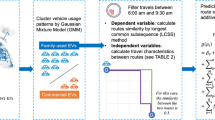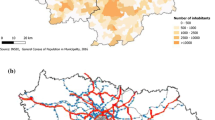Abstract
This study aims to identify the patterns of behavior which underlie human mobility. More specifically, we compare commuters who drive in a car with those who use the train in the same geographic region of the Netherlands. We try to understand the mode choices of the commuters based on three factors: the cost of the transport mode, the CO\(_2\) emissions, and the travel time. The analysis has been based on data consisting of travel transactions in the Netherlands during 2018 containing over half a million records. We show how this raw data can be transformed into relevant insights on the three factors. A large difference is observed in terms of CO\(_2\) emissions and cost, a minor difference in speed. Besides, the computation of congestion shows intuitive results. These results can be used to stimulate behavioral change proactively and to improve trip planners.
Access this chapter
Tax calculation will be finalised at checkout
Purchases are for personal use only
Similar content being viewed by others
References
Lijst emissiefactoren, totale lijst (2020). https://www.co2emissiefactoren.nl/lijst-emissiefactoren
Da Silva, M.G.: Measurements of comfort in vehicles. Meas. Sci. Technol. 13(6), R41 (2002)
Evans, G.W., Lercher, P., Meis, M., Ising, H., Kofler, W.W.: Community noise exposure and stress in children. J. Acoust. Soc. Am. 109(3), 1023–1027 (2001)
Evans, G.W., Wener, R.E.: Rail commuting duration and passenger stress. Health Psychol. 25(3), 408 (2006)
Frumkin, H.: Urban sprawl and public health. Public Health Rep. (2016)
Glass, D.C., Singer, J.E.: Urban stress: experiments on noise and social stressors (1972)
Kluger, A.N.: Commute variability and strain. J. Organ. Behav.: Int. J. Ind. Occup. Organ. Psychol. Behav. 19(2), 147–165 (1998)
Schade, J., Schlag, B.: Acceptability of urban transport pricing strategies. Transport. Res. F: Traffic Psychol. Behav. 6(1), 45–61 (2003)
Singer, J.E., Lundberg, U., Frankenhaeuser, M.: Stress on the train: a study of urban commuting. Psychological Laboratories, University of Stockholm (1974)
Slik, J., Bhulai, S.: Transaction-driven mobility analysis for travel mode choices. In: Proceedings of the 11th International Conference on Ambient Systems, Networks and Technologies (ANT), pp. 169–177 (2019)
Wener, R., Evans, G.W.: Transportation and health: the impact of commuting. In: Encyclopedia of Environmental Health, pp. 400–407. Elsevier Inc. (2011)
Wener, R.E., Evans, G.W., Phillips, D., Nadler, N.: Running for the 7: 45: the effects of public transit improvements on commuter stress. Transportation 30(2), 203–220 (2003)
Williams, G., Murphy, J., Hill, R.: A latent class analysis of commuters’ transportation mode and relationships with commuter stress. In: Fourth International Conference on Traffic and Transport Psychology, Washington, DC (2008)
Author information
Authors and Affiliations
Corresponding author
Editor information
Editors and Affiliations
Rights and permissions
Copyright information
© 2022 The Author(s), under exclusive license to Springer Nature Switzerland AG
About this paper
Cite this paper
Slik, J., Bhulai, S. (2022). Understanding Human Mobility for Data-Driven Policy Making. In: Phillipson, F., Eichler, G., Erfurth, C., Fahrnberger, G. (eds) Innovations for Community Services. I4CS 2022. Communications in Computer and Information Science, vol 1585. Springer, Cham. https://doi.org/10.1007/978-3-031-06668-9_12
Download citation
DOI: https://doi.org/10.1007/978-3-031-06668-9_12
Published:
Publisher Name: Springer, Cham
Print ISBN: 978-3-031-06667-2
Online ISBN: 978-3-031-06668-9
eBook Packages: Computer ScienceComputer Science (R0)




